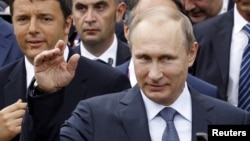Restrictions on freedom of expression, politically-motivated prosecutions, and government discrimination against minorities were among the most significant human rights problems in Russia last year, the U.S. State Department says in its newly-released human rights report for 2014.
The report, released Thursday, says Russia's government last year used a variety of legislation to restrict freedom of speech and press, including new amendments to the law on extremism broadening the definition of extremist speech, and increasing fines and prison sentences. It also notes that government-controlled Russian media frequently used terms like "traitor,” “foreign agent,” and “fifth column” to describe government critics.
According to the report, the government also "exercised greater editorial control over state-controlled media than previously" and put pressure on independent media, constraining coverage of such topics as the situation in eastern Ukraine, where Russia-backed separatists are battling the central government; human sexuality issues; the environment; and criticism of local or federal leadership.
The State Department says Russian officials in 2014 "again denied due process to defendants in politically motivated cases." These included several people arrested after a mass protest in Moscow against President Vladimir Putin in 2012; Yevgeny Vitishko, the environmental activist imprisoned for anti-corruption activism during last year's Sochi Olympics; and anti-corruption campaigner and opposition blogger Alexei Navalny and his brother Oleg, who were convicted of fraud last December.
The Russia government also fined selected non-governmental organizations (NGOs) and "stigmatized them" by adding them to a list of registered "foreign agents," while failing to bring to justice those responsible for the deaths of prominent journalists, activists, and whistleblowers, the report states.
The State Department says Russian authorities continued last year to discriminate against and politically prosecute homosexual persons, and some religious and ethnic minorities. According to the report, they used the country’s law prohibiting the “propaganda” of nontraditional sexual orientations to minors to warn or prosecute media outlets that presented homosexual persons in a positive or neutral manner. Authorities also used vague extremism laws to censor religious materials of minority religious groups, including the Jehovah’s Witnesses.
The report notes that international monitors and human rights NGOs "attributed thousands of civilian deaths and injuries, as well as widespread human rights abuses," to Russia-backed separatists in eastern Ukraine and the authorities in Crimea, which Russian annexed from Ukraine last year.
The State Department human rights report for 2014 says that the continuing conflict between government forces and Islamist militants in Russia's North Caucasus "led to numerous human rights abuses, including killings, torture, physical abuse, politically motivated abductions, and a general degradation in rule of law."
In the North Caucasus republic of Chechnya security forces directly under the control of Chechen leader, Ramzan Kadyrov, "engaged in several instances of collective punishment of those either accused of — or allegedly affiliated with — terrorist activities, including family members," the report states. "Chechen authorities also failed to assure the safety of some human rights defenders," it adds.
Russia's Tass state news agency quoted the Russian Foreign Ministry's human rights envoy, Konstantin Dolgov, on Thursday as telling a Russian radio station that the methodology the U.S. State Department uses to prepare its annual human rights reports is "flawed," and that the reports are an attempt to lecture Russia and other countries about "how to build a real democracy."
The State Department human rights reports, Dolgov said, contain no "constructive criticism" and are written "with a claim to absolute rightness."




